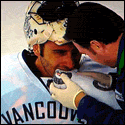|
General Battuta posted:Just got two offers from agents on my first novel and an interview at Bungie Studios for a writer position. To everyone mired in the loneliest, bleakest parts of writing, there is hope in this world Super-congrats. I really enjoy your work, you deserve it. Waiting on a rejection any day now from Strange Horizons, myself. e: that's what I get for saying something, it came this evening. neongrey fucked around with this message at 06:38 on Feb 13, 2014 |
|
|
|

|
| # ? May 11, 2024 11:30 |
|
Hey y'all, this is my entry for the element's thunderdome contest and I was hoping someone could critique it a bit. I realized after the response and my dishonorable mention how clumsily I had portrayed my thoughts which surprised me because I had come away from it thinking it was pretty solid. How wrong I was. Anyways I was hoping for a thorough critique from someone who knows what they're doing on my story. If you could. I know I'm fairly bad with commas and grammar but I don't exactly know how to fix it so if someone could take a stab at giving me some info on that it would be helpful. Here's the original for comparison: Modern Magic Here's the 'fixed' post: Modern Magic elfdude fucked around with this message at 06:42 on Feb 13, 2014 |
|
|
|
General Battuta posted:Just got two offers from agents on my first novel and an interview at Bungie Studios for a writer position. To everyone mired in the loneliest, bleakest parts of writing, there is hope in this world
|
|
|
|
General Battuta posted:Just got two offers from agents on my first novel and an interview at Bungie Studios for a writer position. To everyone mired in the loneliest, bleakest parts of writing, there is hope in this world Dude. Dude. I'm taking a shot in your honour right frickin' now. Maybe someday I, too, will have agents! That'll require actually finishing a novel, of course. Preferably one that doesn't suck.
|
|
|
|
elfdude posted:Hey y'all, this is my entry for the element's thunderdome contest and I was hoping someone could critique it a bit. I realized after the response and my dishonorable mention how clumsily I had portrayed my thoughts which surprised me because I had come away from it thinking it was pretty solid. How wrong I was. Anyways I was hoping for a thorough critique from someone who knows what they're doing on my story. If you could. I know I'm fairly bad with commas and grammar but I don't exactly know how to fix it so if someone could take a stab at giving me some info on that it would be helpful. I came away from this positive English must be your second language, or you're in the third grade. I honestly don't even know what to say about this that could help. Anyone? Spend the next week reading for as many hours in the day as you have free. Buy an elementary school grammar textbook.
|
|
|
|
blue squares posted:I came away from this positive English must be your second language, or you're in the third grade. I honestly don't even know what to say about this that could help. Anyone? Spend the next week reading for as many hours in the day as you have free. Buy an elementary school grammar textbook. Ouch! Yeah, English is my first language. I got a lot of useful critiques from the fiction farm. In the end I think the difficulties in this story come from a few separate things: 1. The overarching idea of a sister who pulls all of the strings of an overconfident OCD wizard who believes himself in control is a great concept. 2. His obsession with time and the clock was a good idea but I failed to dig into it early enough and so it came across as a false addon 3. The lack of chemistry between him and his sister was obvious but lack of characterization really explained why which is difficult when an explanation should be necessary, at the very least the death where the most important thing to him was the sound of the clock seemed appropriate 4. The concepts inherent in the story are quite solid, the problem is how they were implemented. To say it was clumsy is being kind. A complete rewrite with the themes in mind is probably necessary 5. Cesium usage was bland, while simply using a digital clock in any capacity would have satisfied the prompt in vague terms there's a lot of potential with cesium that was entirely ignored. You did manage to reinforce the obvious though. Thanks.
|
|
|
|
Look, I know I'm being an rear end in a top hat about it and maybe I'll get probated or something, but I'm not talking about your concepts. I didn't actually read the story, I just looked at your sentences. I'm talking about the grammar. It's fundamentally hosed up. Before you worry about whether you're introducing clocks properly or writing with themes in mind, you need to know how to construct a basic sentence and use proper punctuation. Somebody has to say it.
|
|
|
|
I would agree with you. The problem is that for me I feel like someone who's unfamiliar with the concept of what a multiplication symbol is being told to multiply 4 and 4, and when I naturally seek help with the concept I'm told that I'm stupid stop trying. My sense of grammar is entirely instinctual not logical which makes trying to identify what isn't correct as far as grammar is concerned quite difficult. I can do pretty well in many cases and I know many 'quick' rules which help out but from a technical perspective I've never truly understood what makes something correct. That said, when I read the story aloud I realized just how insanely poor that grammar was. I can hear it but I can't really identify why or what it is. This is complicated by my insider bias which is to say, I can understand what I mean because I'm me, which means even if it's not correct I'll often read it as though it were. Anyways, I get what you're saying, all I'm asking for is an attempt to help me fix it rather than a statement of the obvious. When you tell me to multiply 4 and 4 and you get the answer back of 8 telling me that I'm wrong doesn't help me to be right.
|
|
|
|
A good way to learn about grammar is to read about grammar. A quick google search for "grammar" will turn up lots if basic resources. You could even search for "grammar basics." If you want a physical book, you can search Amazon.com for grammar books, too. Several books on the mechanics of writing have been recommended throughout this thread. Reading this thread would be a good place to start if you are overwhelmed by the number of choices on Amazon.com. In case that is too intimidating, here are two that I like: Strunk & White is the most "classic" book, but it has received criticism for being too prescriptive and not following its own rules. Eats, Shoots & Leaves is more modern and has panda bears on the cover. Both will help you learn where to put commas, though. Dr. Kloctopussy fucked around with this message at 23:30 on Feb 13, 2014 |
|
|
|
The easiest way to learn grammar is to read, a lot. Grammar books are boring, you can get away with a lot of stuff in writing that's technically ungrammatical if you develop an ear for what sounds non-clunky. (For instance, I did something hideously ungrammatical in that last sentence and only a tremendous pedant would get mad over it.)
|
|
|
|
elfdude posted:I would agree with you. The problem is that for me I feel like someone who's unfamiliar with the concept of what a multiplication symbol is being told to multiply 4 and 4, and when I naturally seek help with the concept I'm told that I'm stupid stop trying. My sense of grammar is entirely instinctual not logical which makes trying to identify what isn't correct as far as grammar is concerned quite difficult. I can do pretty well in many cases and I know many 'quick' rules which help out but from a technical perspective I've never truly understood what makes something correct. That said, when I read the story aloud I realized just how insanely poor that grammar was. I can hear it but I can't really identify why or what it is. This is complicated by my insider bias which is to say, I can understand what I mean because I'm me, which means even if it's not correct I'll often read it as though it were. From what I'm reading, it sounds like you're asking for an easy fix to improper grammar, but the simple fact is there isn't one. There are many different facets to books that are subjective: theme, plot, motivations, etc. can always be taken on the merit of what is being put on display in a story's structure. Grammar isn't one of those things; either it's right or it's not. That you say you have "quick rules" to help you out grammatically leads me to believe you perhaps don't quite understand just how fundamental grammar is to telling a coherent and engaging story. It's like trying to shoot a movie without putting film stock in the camera (or, if we want to go all 21st century with this analogy, forgetting to load an SD card). Being able to form a well structured sentence is not something you can just learn with a few tips and tricks from more competent writers and a handful of "quick rules." There are reasons we have English and Composition classes thrust upon us at basically every level of education. Anyway, this isn't the thread for critiquing work - that's the fiction farm thread, which you've already found. And it appears to me you've already received a couple very thorough critiques of your work, so I would suggest reading over those very carefully and gleaning what you can. Another suggest: start a new story. Sometimes trying to take the things you've learned and plugging them into an utter mess only makes things worse and stunts your growth. Take the advice people have given you, really really ingest it (and believe me - from reading your exert, you need to ingest it), then start something else from scratch and see what transpires. Edit: also, as other's have suggested, read a lot. Like, A LOT. Edit 2: and to add a little bit of clarification - when I say grammar is either right or it's not, I'm not saying it's a hard-lined thing that should keep you up at night with worry. Obviously there are plenty of successful authors who bend grammatical rules as it suits their story, but they can do so because they already have firm grasp of the rules. At the risk of sounding clique, you have to know the rules in order to effectively break the rules. Cpt. Mahatma Gandhi fucked around with this message at 23:44 on Feb 13, 2014 |
|
|
|
Dr. Kloctopussy posted:A good way to learn about grammar is to read about grammar. A quick google search for "grammar" will turn up lots if basic resources. You could even search for "grammar basics." If you want a physical book, you can search Amazon.com for grammar books, too. I actually own eats, shoots & leaves and I think reading through that book was the first time I really understood that writing wasn't an organic anything goes phenomena but rather much more akin to a mathematical equation. I've definitely invested a lot of time reading through this thread but general studies rarely compare to a direct answer. God Over Djinn posted:The easiest way to learn grammar is to read, a lot. Grammar books are boring, you can get away with a lot of stuff in writing that's technically ungrammatical if you develop an ear for what sounds non-clunky. (For instance, I did something hideously ungrammatical in that last sentence and only a tremendous pedant would get mad over it.) Yeah, I would agree with that. I would attribute nearly all of my grammar understanding to reading. I was one of those kids who read very advanced books very quickly which was great at the time but it also kept me from learning a lot of basics because I skipped the grades where sentence diagramming for example was important. I definitely understand the idea that reading leads to an improvement in writing overall but I'm also someone who prefers to be mathematically exact. That's difficult when you don't possess the fundamentals to really view grammar in those terms however. Cpt. Mahatma Gandhi posted:From what I'm reading, it sounds like you're asking for an easy fix to improper grammar, but the simple fact is there isn't one. There are many different facets to books that are subjective: theme, plot, motivations, etc. can always be taken on the merit of what is being put on display in a story's structure. Grammar isn't one of those things; either it's right or it's not. No. It's actually the opposite. I've been fed easy fixes my entire life mostly because I skipped the long but thorough pathway as a child. What I want to understand about grammar is the technicalities to the point that I can reliably look at something and say this is grammatically correct and here's why, vs this isn't grammatically correct and here's why. Cpt. Mahatma Gandhi posted:That you say you have "quick rules" to help you out grammatically leads me to believe you perhaps don't quite understand just how fundamental grammar is to telling a coherent and engaging story. It's like trying to shoot a movie without putting film stock in the camera (or, if we want to go all 21st century with this analogy, forgetting to load an SD card). Being able to form a well structured sentence is not something you can just learn with a few tips and tricks from more competent writers and a handful of "quick rules." There are reasons we have English and Composition classes thrust upon us at basically every level of education. That's exactly my point. My the quick rules only help so much. Cpt. Mahatma Gandhi posted:Another suggest: start a new story. Sometimes trying to take the things you've learned and plugging them into an utter mess only makes things worse and stunts your growth. Take the advice people have given you, really really ingest it (and believe me - from reading your exert, you need to ingest it), then start something else from scratch and see what transpires. Thank you for the suggestions.
|
|
|
|
Then look up as many sources on creative writing as you possibly can, and pay attention to the sentence construction and flow in the books you read (you already mentioned that reading your story out loud helped - do that with your future stories and some of the other books you read to develop an ear for it). I learned grammar mostly from absorbing it through reading before I started paying attention to the actual rules, and I honestly don't understand how your grammar is that bad if you read that much and have read books on the subject. Just...read more, then, with an eye to learning instead of just consuming. Public schooling is terrible whether you skipped grades or not, that's not an excuse to throw up your hands. Writing and grammar really aren't anything like math. Stop comparing them.
|
|
|
|
Edit: you can safely replace "grammar" in this post with "punctuation," which is more specific and possibly more helpful.elfdude posted:I actually own eats, shoots & leaves and I think reading through that book was the first time I really understood that writing wasn't an organic anything goes phenomena but rather much more akin to a mathematical equation. I've definitely invested a lot of time reading through this thread but general studies rarely compare to a direct answer. If you want to learn a specific rule, look up that rule. I gave you recommendations for sources that cover the basics and specifics, because you have repeatedly stated you lack the fundamentals. This thread is not your personal grammar handbook. There are plenty of well-written grammar resources available, including many for free on the Internet. Nearly all of these resources answer specific grammar questions in a direct and accessible manner. You can also look in Eats, Shoots & Leaves, since you already own it. quote:I definitely understand the idea that reading leads to an improvement in writing overall but I'm also someone who prefers to be mathematically exact. That's difficult when you don't possess the fundamentals to really view grammar in those terms however. If you need to learn the fundamentals, learn the fundamentals. This thread is not your fundamental grammar handbook. There are plenty of well-written grammar resources available, which cover the fundamentals. Many of these resources are available for free on the Internet. quote:No. It's actually the opposite. I've been fed easy fixes my entire life mostly because I skipped the long but thorough pathway as a child. What I want to understand about grammar is the technicalities to the point that I can reliably look at something and say this is grammatically correct and here's why, vs this isn't grammatically correct and here's why. You complain that you were only fed quick fixes as a child, but now you're asking us to feed you the long answers, too. Go find them. It's not hard. quote:Thank you for the suggestions. You can thank us all you like, but you're not going to make any progress until you quit making excuses for why they aren't the perfect suggestions for you. Dr. Kloctopussy fucked around with this message at 01:53 on Feb 14, 2014 |
|
|
|
Are you autistic in any way? Serious question. (USER WAS PUT ON PROBATION FOR THIS POST)
|
|
|
|
I know this sounds pedantic, but I think it's an important point that everyone is misunderstanding. The definition of 'grammar' that everyone is using here is not what grammar actually is. Grammar is the computer-like machinery in your brain that can create a coherent sentence. quote:He is helped me cast cool spells That sentence is ungrammatical, and your English-speaking brain feels that when you read it. Nothing in elfdude's piece was an actual grammar mistake; there were typos, bad punctuation, and clunky writing in general, but no bad grammar. The multiple sentence fragments were the closest thing he had to bad grammar, but they were still something a native speaker would potentially say. Sentence fragments happen in normal speech, and in context they are understood. I agree they are bad writing in this case, but they are not bad grammar. Before you write me off as pedantic and my point as irrelevant, just consider that taking a bunch of random elements of writing and throwing them under the umbrella of "grammar" is pointless. I just poked holes in the definition you are all using to show you that it's wrong, but I don't think my definition makes any of the criticisms invalid, nor does my definition help him in any way. The "writer's definition of grammar" is basically just spelling, punctuation, and various elements of style. It is not a helpful thing to talk about because you are for some reason separating out small issues and conflating them with grammar. Elfdude's issue is not grammar, it's just writing. He needs to learn to spell, and to not type stuff like "watche's," but that isn't bad grammar. If he just typed in googledocs or Word, it would fix those dumb errors for him automatically. It's important to have good spelling and adhere to punctuation conventions when you are starting out writing, but since there really are no hard and fast rules, telling a native speaker to "work on his grammar" is a really useless exercise. It might help him to realize that he doesn't have any issues with grammar, and that he doesn't need to read loving grammar books. He just needs to google stuff like "semicolon vs. comma" when he is writing and isn't sure. Or google "do you use apostrophes when you are typing a plural" etc. It's a waste of time to sit down and study punctuation and what makes a complete sentence as a separate exercise. His piece wasn't great, but it was still better than a lot of things I've seen in the Dome that had no spelling or punctuation mistakes, but were completely devoid of life and feeling. He should do most of what everyone has recommended, but I really hate the fake idea of "grammar" in writing. I have stopped reading a story for bad punctuation and spelling, mostly because it is a sign. If someone can't spell or doesn't know where to put a comma, it means they probably haven't written enough for the writing to be good. It's like a warning sign. Elfdude should just keep writing and google specific style problems as he goes, and use a loving spellchecker.
|
|
|
|
elfdude posted:
Honestly if that's what you want then you came to the wrong place to seek your answers, because there's not a person in this forum who could explain all the complex technicalities of grammar in a single post. We can give you suggestions on how you might develop and improve your understanding of grammar (and we have, whether you want to follow the advice or not), but we can't say "hey, here's how to be a good writer!."
|
|
|
|
systran posted:I know this sounds pedantic, but I think it's an important point that everyone is misunderstanding. The definition of 'grammar' that everyone is using here is not what grammar actually is. Grammar is the computer-like machinery in your brain that can create a coherent sentence. Where in the hell did you come up with this nonsense? Grammar is the set of rules governing the use of clauses, phrases, words, and punctuation. There are real actual rules that exist for a reason, and elfdude's writing broke several. No hard and fast rules? Sure, when you're speaking in dialects, but typically we write in Standard Written English, unless you're going for a specific character's voice, and SWE has grammatical rules. And your advice to just write with a word processor that fixes things automatically for you? Ridiculous. Why bother learning anything when a computer will do it for you, right? blue squares fucked around with this message at 02:14 on Feb 14, 2014 |
|
|
|
blue squares posted:Where in the hell did you come up with this nonsense? The word 'grammar' has two different meanings in English. One 'grammar', which systran is drawing our attention to, is whatever special brain-mechanism or knowledge tells every fluent English speaker that this is fine: quote:(1) I know a man who likes to eat peanuts. and this isn't: quote:(2) What do you know a man who likes to eat? You, me, and elfdude, all presumably native English speakers, would never write a sentence that looked like (2) (except as a result of failing to proofread, which I think is one of elfdude's problems). Yet nobody sat any of us down, presumably, and told us that (2) is bad, or even that the class of sentences that look like (2) are bad. We just know it, and the process/knowledge/organ/whatever (what exactly the grammar 'is' is contentious among linguists) that tells us that is called the 'grammar'. This is the 'grammar' part of, for instance, 'generative grammar' (Chomsky, and plenty of others) or 'head-driven phrase structure grammar' (Pollard & Sag), etc. In this sense, no fluent English speaker has a 'bad grammar', because grammar is simply the knowledge (or whatever) shared by speakers of a language. This doesn't mean that 'anything goes' (if it did, then (2) would be fine, because it's obvious what it's trying to communicate). Elfdude's 'grammar' is fine; if it wasn't, he'd sound like an idiot when he talks, and he probably doesn't. The second definition of 'grammar' is largely spelling and punctuation, along with a couple of idiotic rules of 'style' that often contradict what fluent English speakers do in practice (don't end sentences with a preposition, herp a derp). I would hazard to say it doesn't exist 'for a reason'; you can come up with post-hoc justifications (please feel free to try! As An Actual Linguist, I promise you I've heard 'em all), but ultimately this stuff is entirely arbitrary. Now the third thing, which is what I think elfdude is sucking at, has nothing to do with grammar, but is just that he isn't experienced enough to write an elegant, aesthetically pleasing sentence except by accident. You fix this by reading lots of good writing, writing a lot, and editing carefully, end of story. ---- *For interested parties, the thing in (2) is called an island violation, and it's one of the major pieces of evidence that gets trotted out against experiential/statistical learning of syntax, because no children are ever taught about them, and we're never exposed to sentences that look like that one. Here are some other ones: quote:(3)What did the man eat peanuts and? quote:(4)Who was the discussion of interesting? quote:(5)Which boy's do you like shirt? God Over Djinn fucked around with this message at 02:38 on Feb 14, 2014 |
|
|
|
I have to say, the individuals who typed the most were definitely the most helpful. I wonder why? I'm not attempting to use this thread as my personal grammar tutor, or punctuation if you're a stickler. I was searching for advice on how to improve my writing. Personally, I feel that punctuation is a minor issue in most of my work, but again I'd agree that this particular story was poorly put together. I typically have a very strong voice which comes with my background as a speech writer. I can write a lot of poetic nonsense that makes a lot of people clap and cheer. That's never been my issue. I don't feel that spelling is a significant issue either, when I proof-read. The single biggest grammatical, if you want to call it that, mistake is ultimately punctuation. My second big mistake is the over-use of cliche and metaphor. Part of the problem there in my opinion is that my understanding of sentence structure is instinctual rather than technical, and thus my ability to produce reliably well punctuated works is based on nebulous factors. No matter how I feel I'll always understand that 2+2=4, and for many people understanding grammar is similar for them. I get the art behind writing, and behind conveying a concept. I've been published and I've won more than a few writing contests and scholarships. The technicalities however, have constantly been a pit-fall for me. Don't get me wrong here either, I've attempted to address these problems many times. I can even produce pretty solid works if I think about things for a long time. Part of the reason I enjoy this community is because for the first time I'm being told that my writing isn't great. Suddenly the capacity for mastery has hit an entirely new level. I want to convey my art in a format that doesn't just please the layman but also pleases the skilled. I don't honestly think that story would do either. I'm not attempting to defend it. Anyways, I've learned a lot here and I'm not trying to be patronizing. I genuinely believe that I can improve my writing significantly with what I've learned. Thank you to those of you who actually made an attempt to help. p.s. As for whether or not I'm autistic, that's a silly question and you should feel ashamed in asking it. The idea that you could diagnose something like that via writing is more than a little stupid. You've pretty clearly demonstrated your only goal here is to be a douchebag, and for that I wish you luck. elfdude fucked around with this message at 03:38 on Feb 14, 2014 |
|
|
|
elfdude posted:
Improvement is the name of the game. We're all improving, all the time, so in that aspect you're already well on your way. We've all been through instances where our writing was far below par. Hell, just the other day I randomly pulled out some of my short stories from college and it was basically a 2-hour long cringe fest (the consumption of booze began about 15 minutes in, which may have affected the amount of cringe to some degree). Yet at the same time I don't regret the poo poo that sucked because it has allowed me to compose the poo poo that hasn't sucked - or, at least, hasn't sucked as hard. I agree with your general perspective that punctuation is your weakest suit. Now, mastery of that skill won't necessarily turn your crap to gold, but garnering a clear understanding of what works well and what doesn't will assist you greatly in your quest to become a better writer. A couple quick suggestions I'll add to my earlier posts - a) Have you read On Writing by Stephen King? I highly recommend it if you haven't. It doesn't get as technical as Elements of Style or Eats, Shoots, and Leaves, but it does give a very comprehensive view on the various aspects of writing good fiction as told by someone who obviously has a pretty good idea of what they're talking about. Honestly it's my favorite book on the craft and I can't praise it enough. b) If you haven't already, set up a daily time to write. Not something that you come to sometimes or every once in a while - something you can do every. single. day. Unless you're a gypsy or juggle nothing but odd jobs, you've probably got at least some routine to you day. For me, I write every morning from 5 to 7, but that's only because I find that to be when I'm most productive. If you work better noon to 2PM or 6 to 8PM, then go with that. And keep in mind I'm only using two hour blocks as an example, not as a hard set rule; it might be easier to start with a half hour and work up as you get used to it. The main key is to write every day; Once you've got that part down, you can start going for longer and longer periods.
|
|
|
|
blue squares posted:Where in the hell did you come up with this nonsense? Grammar is the set of rules governing the use of clauses, phrases, words, and punctuation. There are real actual rules that exist for a reason, and elfdude's writing broke several. No hard and fast rules? Sure, when you're speaking in dialects, but typically we write in Standard Written English, unless you're going for a specific character's voice, and SWE has grammatical rules. And your advice to just write with a word processor that fixes things automatically for you? Ridiculous. Why bother learning anything when a computer will do it for you, right? Hakuna your tatas, my son. Let anger not be the guide in composing your words, for the message shall indubitably be lost on the reader.
|
|
|
|
A formal understanding of grammar can improve your writing a lot. For example, I was talking earlier with somebody on irc about Garden Pathing, which is something to be aware of when you write. An awful lot of muddled/unclear stories in the 'dome are technically correct, but include a lot of garden-path sentences, which scan poorly. Or, for example, when writing a flashback or a memory-within-a-memory or something equally convoluted, you can write the flashback in the past perfect ("he had eaten") rather than the regular past ("he ate") to help clear up any confusion. I'm not saying do a linguistics degree, but understanding why we use each tense and how we process the written word will improve your writing a lot.
|
|
|
|
elfdude posted:I have to say, the individuals who typed the most were definitely the most helpful. I wonder why?
|
|
|
|
elfdude posted:Personally, I feel that punctuation is a minor issue in most of my work The thing is, writing is an act of communication, and that means you rely on the perceptions of others. You know your piece, and what you're getting at. The punctuation is not especially interesting to your brain, because it's already got all the data of the story in there. The rest of us don't have that benefit. Bad punctuation confuses the eye, and drags attention away from the words. It becomes difficult to see past it. It means that the reader has to put in serious effort just to unpick what you're saying. The reason we're all fixating on this is that we can't just 'look past it'. The brain isn't wired that way. Communication has rules, and the brain uses those rules, mostly unconsciously, to work out what the message actually is. So, as a professional editor and author, my very strong advice is to concentrate on fixing your punctuation and other mechanical errors first. Get the communication protocols right. Then you'll be in a much stronger place to start improving the content of your writing. Try tracking down a copy of Lewis Turco's "Dialogue"; there's a bunch of stuff in there that could help, and the whole book is written as a conversation, which makes it less dry than most punctuation-related works.
|
|
|
|
Most of my critiques in the Thunderdome have been about my comma usage and the lack of flow in the sentences i use. I've been reading up about the flow of paragraphs. The importance of correct comma usage and to try and curb the obsession with using semi-colons when a simple comma would suffice. Can i ask if this little piece of my next Thunderdome piece flows well? Also is the comma usage acceptable? He waits for his time to come, but it never does. Waiting to be happy gets to a man in the end; he begins to see despair in other peoples joy, he starts to wish for bad things to happen to good people just so he has company. In the end that man stops living, wasting the time he has left wishing it was better, wishing he has another chance, another tomorrow. Sometimes, though, tomorrow never comes. Please be as brutal as you want. Although maybe skip asking if i have autism.
|
|
|
|
elfdude posted:This is complicated by my insider bias which is to say, I can understand what I mean because I'm me, which means even if it's not correct I'll often read it as though it were. There's a lot of great writers here who have mastered the language, (not me). If you're set on writing the book you want to write, then that's a good thing. If your grammar errors are getting in the way of your story for most people, that's a bad thing, unless that's your goal (like Flowers for Algernon or No Country For Old Men). If you're looking for the bigger answers, story, character, themes, etc, it'll save you time to keep the conversation focused on that. edit: that SOUNDS snarky and hall-monitorish, but it's not how I meant it. magnificent7 fucked around with this message at 17:12 on Feb 14, 2014 |
|
|
|
Mr_Wolf posted:Can i ask if this little piece of my next Thunderdome piece flows well? Also is the comma usage acceptable? I think one of the big problems I'm seeing here is your sentences are too convoluted. You're saying things with too many words and tortured sentence structures that sound awkward. Here's a quick example: Mr_Wolf posted:Waiting to be happy gets to a man in the end; he begins to see despair in other peoples joy, he starts to wish for bad things to happen to good people just so he has company. "Waiting to be happy gets to a man in the end" could easily be "Waiting for happiness gets to a man"; "he sees despair in others' joy, he wishes bad things on good people" etc. It's not the only problem and those easy rewrites I just did aren't really good either but it's something to watch out for if you want your prose to flow better.
|
|
|
|
Mr_Wolf posted:
This is a matter of taste, but the voice here feels too... filmy. A bit overblown, like the "War never changes" monologue from Fallout. Or a pulpy detective novel. I think it's the commas, adding slightly too much space to the read. It depends how much gravitas you're going for. But this feels too far. Maybe have some stuff happen. Or have someone say these things, not the disembodied movie-trailer godvoice.
|
|
|
|
Revisions in bold (I'm only looking at punctuation, not much on prose/word choice since others have pointed out earlier):Mr_Wolf posted:He waits for his time to come, but it never does. One of the problems I had with your punctuations is dialogue tags. The correct tags should be: John said, "I would like that. Blueberry pancakes are great." "I would like that," John said. "Blueberry pancakes are great." "I would like that." John played with his phone. "Blueberry pancakes are great." "I would like that. Blueberry pancakes are great," John said. Sometimes I see you not bothering with the commas or periods, or even putting them outside the quotation marks. It's pretty distracting so that's something you would need to be aware of. magnificent7 posted:If your grammar errors are getting in the way of your story for most people, that's a bad thing, unless that's your goal (like Flowers for Algernon or No Country For Old Men). Only do this if your grasp of the grammar of the English language is strong enough that you know how to violate them. The Saddest Rhino fucked around with this message at 18:16 on Feb 14, 2014 |
|
|
|
The Saddest Rhino posted:Sometimes I see you not bothering with the commas or periods, or even putting them outside the quotation marks. It's pretty distracting so that's something you would need to be aware of. I feel like I'm probably going to kick up some kind of terrible grammar derail here, but my understanding is that the punctuation inside/outside quotations thing is more a matter of UK vs. US English and ultimately comes down to personal preference so long as you pick one and stick with it.
|
|
|
|
Opposing Farce posted:I feel like I'm probably going to kick up some kind of terrible grammar derail here, but my understanding is that the punctuation inside/outside quotations thing is more a matter of UK vs. US English and ultimately comes down to personal preference so long as you pick one and stick with it. I did wonder about it, so I checked and http://www.bbc.co.uk/dna/hub/A3046349 states that it's supposed to be inside the quotations in UK (ignore the bits about nested quotes, which is irrelevant but also threw me off a loop in my first read), and http://litreactor.com/columns/talk-it-out-how-to-punctuate-dialogue-in-your-prose confirms it is done that way in American English. I'm still willing to concede that I may be wrong, but I rarely ever see punctuation outside quotation marks and presume they should always be inside.
|
|
|
|
Opposing Farce posted:I feel like I'm probably going to kick up some kind of terrible grammar derail here, but my understanding is that the punctuation inside/outside quotations thing is more a matter of UK vs. US English and ultimately comes down to personal preference so long as you pick one and stick with it. No, it's the same between UK english and US english. I do see the mistake made often with non-native speakers, so it's possible that's where your confusion comes from. In some other languages punctuation marks have different rules but use the same punctuation marks as we do.
|
|
|
|
Mr_Wolf posted:
Brutal critiques aren't necessarily good critiques (it's easy to be a snarky dick; being helpful, clear, and thorough is another matter). But in re: your excerpt-- Your flow, depending on how you want to define it, is fine. The structure of the sentences adds to the tone, which is one hallmark of good writing. But another hallmark--and a more important one--is insight and implication through detail. What you have here is kinda-sorta insightful (the idea that we want others to suffer because we want company in our own suffering is pleasantly complex, but sits on the edge of over-blown cliche, eg "tomorrow never comes"); there isn't much implication (you straight-up explain the point of what you're saying), and there's no detail for the reader to ground themselves in--you're just in a headspace. Detail is the most valuable part because well-chosen details, besides doing a lot of other important things like establishing scene and character, power both implication and insight. That's what people mean when they open the ark of the writer's covenant and pull out some broke-rear end stone tablet that says "Show, don't tell." So how does that translate into good writing? Take what you've said here and find a way to imply it. eg: quote:Waiting to be happy gets to a man in the end; he begins to see despair in other peoples joy, he starts to wish for bad things to happen to good people just so he has company. You can show this through detail and action. I don't know the setting or the scene that led to this insight, so I can't give any example specific to your story, but let's look at some off-the-cuff options. Maybe the guy has photos of other people (old friends? Family?) and he takes a Sharpie and draws knives stabbing into them (secondary implication: he's childish). Maybe he cuts off their hair so it looks like they're going through chemo (secondary implication: either he's ignorant of the pain of cancer, or maybe he's just vicious). Whatever the details, if he frowns or cries doing this bit of Martha Stewart scrap-booking but smiles at both his real pain and their imagined pain when it's finished, you imply that he's happy with the result--he doesn't want to see them being hurt, exactly; he just wants companionship. So anyway, yeah. The flow of sentences is important, of course (they call it lyricism for a reason), but worry more about content on a first draft. Flow comes with a second. Make that first draft about character (emotion) and about story (momentum) while seeing old things in new ways (insight) and saying old things in new ones (implication). The fun part of writing--the part that makes your brain feel like it's firing on all cylinders--is inventing new ways to do all that at once. edit for clarity also this is the thread where I try to articulate the lessons I want teach my students, so I'm probably coming off long-winded and poo poo, let me know if I ever start sounding like some pompous academic clownshoe Asbury fucked around with this message at 01:47 on Feb 15, 2014 |
|
|
|
Mr_Wolf posted:He waits for his time to come, but it never does. It would flow better without the repeated words and phrases. "In the end" definitely needs to go, and even the "come/never" combination is too close together. I'm pretty sure I've read some advice to edit out "begins/starts to" as they're typically useless filler words. As for punctuation: there's a missing apostrophe you'll want to fix, and there's a comma splice though I'm personally completely okay with it in a parallel construction. Thematically I'm not sure there's such an obvious link between "waiting to be happy" and "wanting others to be unhappy" unless it's being used intentionally to show some psychological issues with your narrator.
|
|
|
|
3Romeo posted:Great stuff Also thanks to everyone else who wrote words on the Internet for a stranger. My TD piece would start off with one of those descriptions. Then i'd go into a specific part of my life that would directly relate to it. Hopefully showing details and thoughts which back up the previous description. It's hard writing about yourself when you try to bury certain thoughts away. Especially ones that make you seem genuinely mental at times.
|
|
|
|
Mr_Wolf posted:
That's when you know it's worth writing about, tbh
|
|
|
|
3Romeo posted:That's when you know it's worth writing about, tbh
|
|
|
|
Erogenous Beef posted:(Character) wants (a thing). (Character) cannot have (a thing) because of (a reason - preferably a character trait or flaw). Ultimately, (character) (does/does not) get (a thing), because (character) grappled with (reason/trait/flaw) and (made a choice/decision) which led to (victory/downfall). That little bolded bit there made me realize something. Until now, I thought it was fine that the obstacle my main character struggled with was a person. Reading that made me go "wait, it's supposed to be a character flaw? So what's my guy's flaw?" It was actually obvious: my main character knew that the obstacle guy had the information he wanted more than anything, but he was too scared to confront him. He'd been running away, fruitlessly trying to find another way for years. Running away, hiding, avoiding confrontation. That was his flaw, and my character was already built around that and having to overcome it... I just hadn't quite made that realization until that little piece of advice from this thread. Does that make sense? This link made me decide to ditch a short, but ultimately unnecessary digression that revealed part of my main character's backstory. I can probably get across what I want with just a sentence or two instead of a chapter or two. Thanks, thread! Stabbey_the_Clown fucked around with this message at 23:45 on Feb 15, 2014 |
|
|
|

|
| # ? May 11, 2024 11:30 |
|
I just finished a book about writing a book, (Writing with the Master: How One of the World’s Bestselling Authors Fixed My Book and Changed My Life). However, it's not so much a how-to book about writing. Best way to describe it is, this book is to writing as The Karate Kid is to Karate. It shows you some tips, some helpful useful stuff, but where it excels is showing you where, as a writer, you might think your work is amazing until somebody critiques it, (in this book, that's John Grisham doing the critiquing/mentoring). The author is pretty candid about his ego and imagination as he's writing it... thinking he's redefining a genre, then reads some of his writing, and it's bad. But he keeps on reading. So much that, at one point, I almost stopped reading because I figured I'd made a mistake buying a poo poo book. But no. He sprains his shoulder patting himself on the back, (I've done that. A lot) and then is slayed when Grisham tears it apart. He goes through the exact stuff I go through with the Thunderdome; denial, bargaining, surrender, and then acceptance. ("They're idiots. What could I do to make it better? gently caress it, I'll never write again, and then, Okay, they have really good points). I haven't found another book about writing that covered that side of it; the thrill of creating a story, the joy of being an artist, the self-loathing of sucking at it. Just thought I'd share. I've spent so much time reading books about writing correctly, and ways to improve your stuff, it's nice to read a book that focuses more on sucking at it for a change. And in the end, he self-published his novel after every agent passed on it. And he completely owns up to the fact that his novel probably isn't that great. Helps reinforce that whole, "do it because you enjoy it, not because you want to get paid." edit: by "read" I mean "listened to audiobook" http://www.audible.com/pd/Self-Development/Writing-with-the-Master-Audiobook/B00HDGCVKQ magnificent7 fucked around with this message at 03:07 on Feb 21, 2014 |
|
|






















